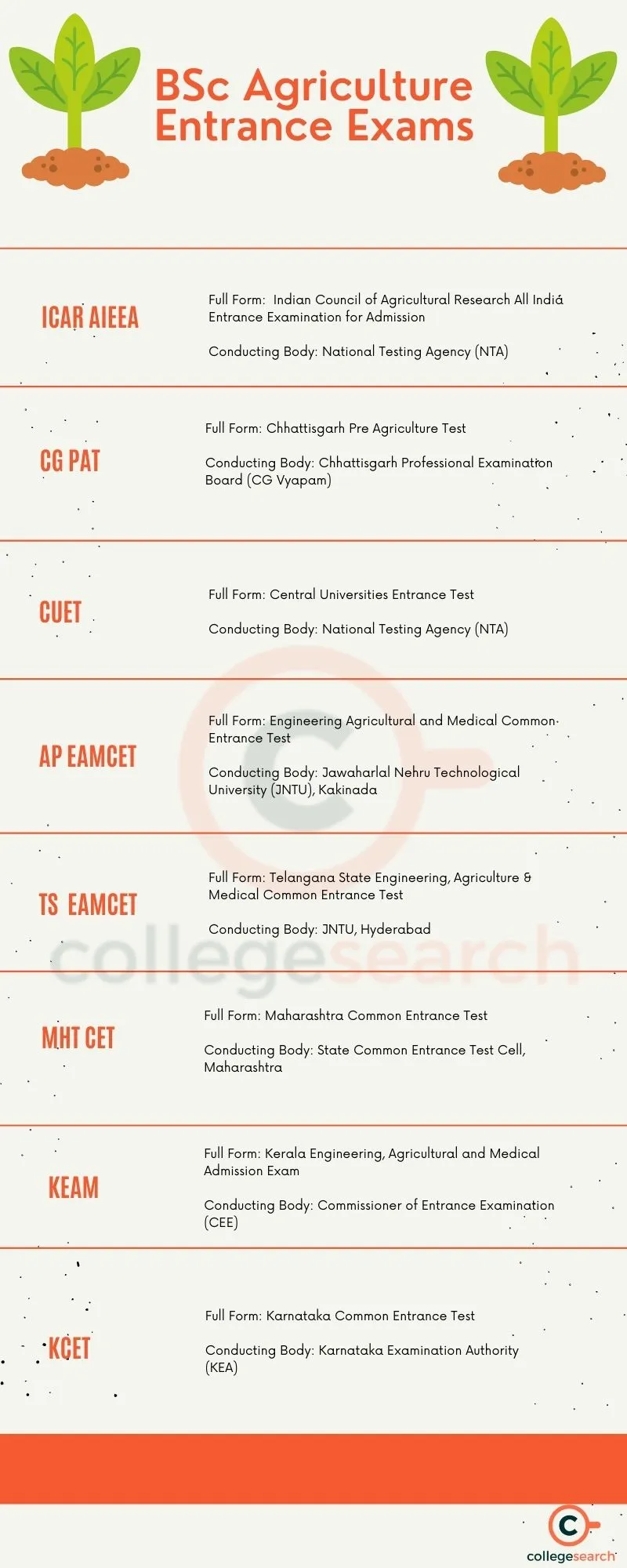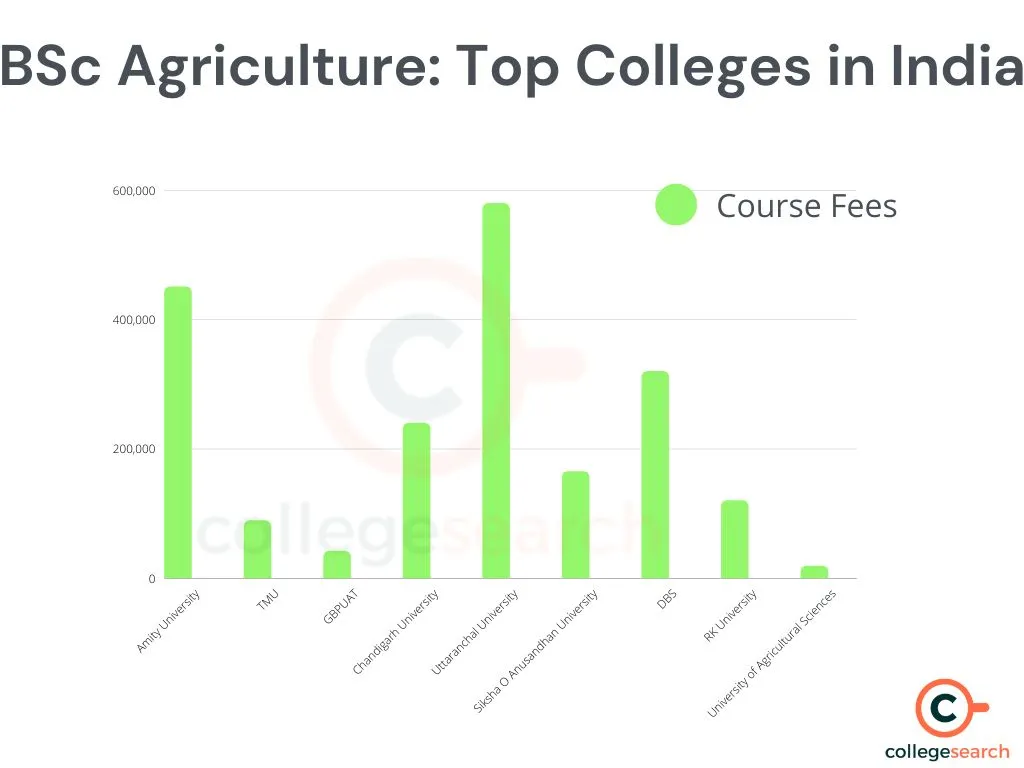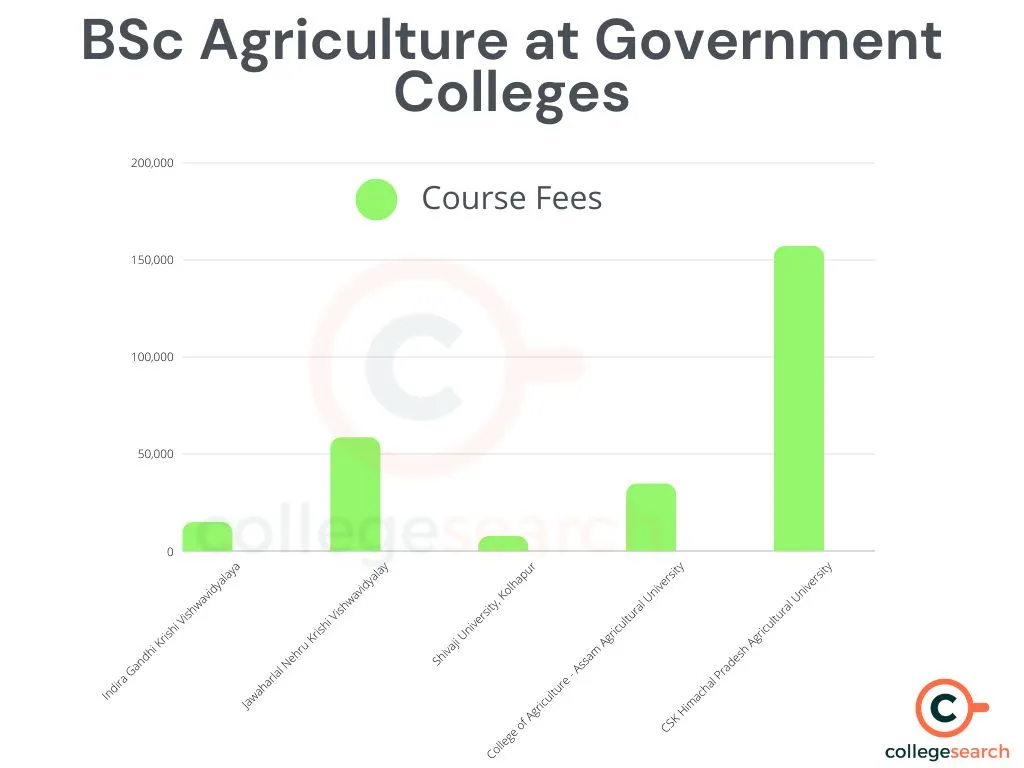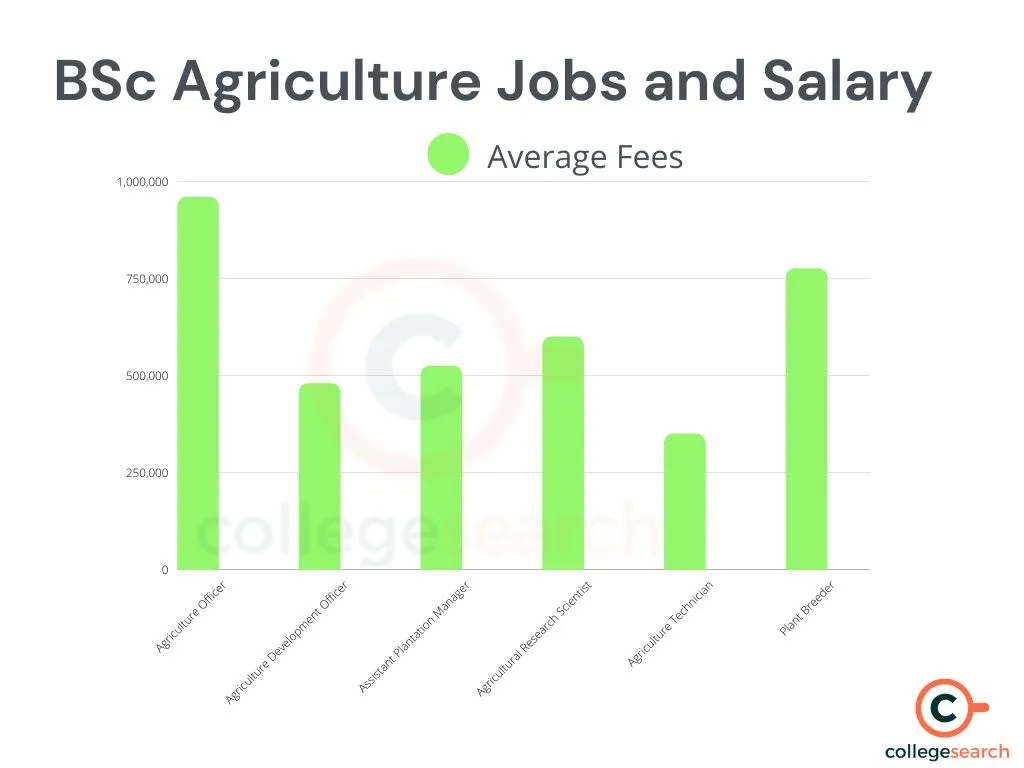BSc Agriculture is an undergraduate in the domain of agriculture and its applications. The professional degree program is recognized by the Government of India. The four-year BSc course largely aims to train students on concepts like agricultural science research and application, soil science, plant pathology, genetics, plant breeding, and agricultural microbiology. Basically, it encourages aspiring agricultural students to use modern-day agriculture technology and methods in real scenarios. Read More: MSc Course
As per the BSc agriculture eligibility criteria, students must have completed Class 12 with Physics, Chemistry, and Biology as the main subjects. BSc Agriculture admissions are based on both entrance exams as well merit and direct interviews. BSc Agriculture Syllabus is divided into eight semesters covering agriculture-related topics like Agronomy, Crop Physiology, Genetics, Plant Biochemistry, Soil Science, Entomology, Horticulture, Agricultural Economics, etc. The top colleges to pursue BSc Agriculture courses are Amity University, Teerthanker Mahaveer University - TMU, Moradabad, etc. BSc Agriculture Fees range between INR 2-3 lakhs.
The BSc agriculture salary initially falls between INR 3- 5 LPA. Some of the common BSc agriculture jobs include Agriculturist, Agriculture Officer, Assistant Plantation Manager, Agriculture Technician, Agricultural Research Scientist, etc.
See Also: Agriculture Courses After 12th, BSc Courses After 12th
More BSc Courses:
BSc Agriculture Course Details

| BSc Full Form | Bachelor of Science in Agriculture |
| BSc Course Duration | 4 Years |
| BSc Eligibility | Minimum 50% score in class 12 Science stream (Physics, Chemistry, Biology) from a recognized educational board |
| BSc Admission Process | Entrance-based/Merit-based |
| BSc Entrance Exams | AP EAMCET, TS EAMCET, KEAM, MHT CET, KCET |
| BSc Agriculture Top Colleges | Amity University, Teerthanker Mahaveer University - TMU, Moradabad, etc |
| BSc Agriculture Fees | INR 2-3 Lakhs |
| BSc Agriculture Salary | INR 4 LPA to INR 6 LPA |
| BSc Agriculture Jobs | Agriculturist, Agriculture Officer, Assistant Plantation Manager, Agricultural Research Scientist, Agriculture Development Officer, Agriculture Technician, etc. |
Find top colleges to study BSc agriculture in your state:
About BSc Agriculture
In this section, we have provided an overview of the BSc Agriculture course program including what is BSc agriculture, its course fees and duration, and why you should pursue this course.
Also Read: MSc Maths Syllabus
What is BSc Agriculture?
BSc Agriculture is a UG professional program offering modern-day scientific practices and procedure. After earning a degree in BSc in Agricultural Science, students can have many job options. BSc Agriculture Jobs come in a variety of forms such as Agricultural Officer, Agricultural Analyst, Plant Breeder, Seed Technologist, etc.
BSc Agriculture Fees and Duration
- The course duration of a Bachelor of Science (BSc) in Agriculture course is 4 years full-time.
- The BSc agriculture fees can be anywhere between 2 – 3 lakhs.
Why Pursue BSc Agriculture Course?
Listed below are the best reasons as to why students should pursue BSc agriculture:
- After earning a BSc in Agriculture, students have a variety of career options. They might take an MSc course or a Masters in Agricultural Sciences course.
- Master's in agriculture can be pursue through a variety of agricultural entrance exams such as ICAR PG, UPCATET, CMAFFU, and others.
- There is also the widely accessible option of taking an MBA/PGDM course.
- Among other things, student can also move forward with government positions such as IBPS, UPSC, FCI, and others. Students can take competitive exams for government jobs because they have graduated.
- Many top institutions like ICAR (Indian Council of Agricultural Research), UAS (University of Agricultural Sciences), University of Edinburgh provide scholarships to agriculture students. These BSc agriculture scholarships include The India Agri Fellowship, University of Edinburgh International Scholarship for Agricultural Science, Netaji Subhas-ICAR International Fellowships, etc.
BSc Agriculture Syllabus
The BSc in Agricultural Science is broken up into 8 semesters to allow students to finish it periodically. Students will master the fundamentals of plants, agricultural economics, and human science in the first year of the course. They will interact with subjects like fundamental agricultural engineering, entomology, and microbiology in their second and third years. Additionally, they will improve their communication and entrepreneurial development skills. Through agronomy and agricultural statistics, they will gain practical on-field experience in their final year.
The syllabus of BSc Agriculture will vary from college to college; however, a brief of the syllabus is given in the following table:
Subjects | Topics |
Agronomy | Crop production and management Crop physiology and growth Crop protection (pests and diseases) Weed management Sustainable farming practices |
Soil Science | Soil formation and classification Soil fertility and nutrient management Soil and water conservation Soil microbiology Soil testing and analysis |
Horticulture | Fruit and vegetable production Floriculture (flower cultivation) Nursery management Greenhouse technology Post-harvest management |
Plant Breeding and Genetics | Principles of plant breeding Genetic improvement of crops Biotechnology in agriculture Seed production and technology |
Animal Husbandry | Livestock management (cattle, poultry, sheep, etc.) Animal nutrition and feeding Animal health and veterinary sciences Dairy and poultry production Meat science and technology |
Agricultural Economics | Farm management and planning Agricultural marketing and trade Agribusiness management Rural development and cooperatives Agricultural finance and policy |
Agricultural Engineering | Farm machinery and equipment Irrigation and drainage systems Post-harvest technology Renewable energy in agriculture Precision agriculture and automation |
Agricultural Extension | Extension education and communication Technology transfer and adoption Rural sociology and community development Farmer support services |
Environmental Science | Environmental conservation in agriculture Sustainable resource management Climate change adaptation and mitigation Biodiversity and ecosystem services |
BSc Agriculture Subjects
Given below are the semester-wise BSc Agriculture subjects applicants will study throughout the course:
BSc Agriculture Syllabus First Year
| Semester 1 | Semester 2 |
|
|
BSc Agriculture Syllabus Second Year
| Semester 3 | Semester 4 |
|
|
BSc Agriculture Syllabus Third Year
| Semester 5 | Semester 6 |
|
|
BSc Agriculture Syllabus Fourth Year
| Semester 7 | Semester 8 |
|
|
BSc Agriculture Eligibility
The following points list the eligibility criteria for BSc Agriculture course:
- Students who want to enroll in the BSc agricultural course must pass the 10+2 exam or a similar exam.
- Students should pass their higher secondary school exams, or any exam of a comparable level with a minimum score of 50%.
- Their higher secondary education must include science-related courses in physics, chemistry, and biology.
- Students who have completed intermediate in the field of agriculture are also eligible for the BSc in Agricultural Science.
- Many universities conduct their own entrance exams to check if students qualify for the course.
BSc Agriculture Entrance Exams
The image below shows the popular entrance exams for BSc Agriculture admissions:

Here is a list of the entrance exams to get admission into BSc Agriculture course:
Name of the Exam | Registration Date | Exam Date |
February 9, 2023 – March 12, 2023 | May 21 – 31, 2023 | |
March 11, 2023 – April 15, 2023 | May 23 – 25, 2023 | |
March 3, 2023 – April 10, 2023 | May 7 - May 11, 2023 | |
March 1, 2023 – April 20, 2023 | May 30 and 31, 2023 | |
To be Announced | To be Announced | |
December 15, 2022 – January 4, 2023 | January 7, 2023 - January 8, 2023 | |
To be Announced | To be Announced |
BSc Agriculture Admission 2023
Each institute has its own unique admissions process. There are mainly two modes in which most colleges and universities grant admissions into BSc in agricultural science.
- Firstly, direct admissions are provided on the basis of merit and personal interview rounds.
- Secondly, some colleges grant admissions based on entrance exams at the national, state, or university levels.

BSc Agriculture Direct Admission
Students must fill out the application form from the college through online or offline mode to be considered for the admission process. Colleges then provide admissions based on the merit score. In addition, some colleges may conduct personal interview rounds as well.
BSc Agriculture Entrance-Based Admission
Students must fill out the registration form for BSc Agriculture Entrance Exams like ICAR AIEEA, KEAM, KCET, etc that grant admissions into universities and colleges. Once the entrance exam results are out, colleges conduct various counseling sessions, which often include Group Discussions and Personal Interviews. Finally, students are granted admission based on the score received in the BSc in agricultural science entrance exams.
BSc Agriculture Scholarships
There are many scholarships available to agriculture students. Many institutions including ICAR (Indian Council of Agricultural Research), UAS (University of Agricultural Sciences), University of Edinburgh, etc offers the best scholarships to deserving candidates.
| Scholarship Name | Organization | Eligibility Criteria | Scholarship Benefits |
| India Agri fellowship | University of Commons | UG/PG degree in agriculture, social work, or business administration. Age: 25-30 | INR 3,00,000 for one year |
| SAARC agriculture PhD scholarship | SAARC Agriculture Centre (SAC) | Aspirants should be employed at National Agricultural Research, education and extension system SAARC member countries (except Afghanistan and Bangladesh) Age: below 40 | Grant USD 1,000 USD 1,000 per year for research purpose USD 600 per month for living expense |
| University of Edinburgh International Scholarship for Agricultural Science | University of Edinburgh | Should be residing outside UK Should accept admission offer
| GBP 7,000 |
| Netaji Subhas-ICAR international fellowships | ICAR (Indian Council of Agricultural Research) | M.A. degree in agriculture and allied sciences Overall GPA score must be 65% Age: 35 years | Cover economy flight ticket of Indian Students USD 2,000 every month USD 1,000 per year only to selected candidates |
Profugo Field Fellowship
| Profugo | Should have a background in education, engineering, business, and agriculture. Should have good entrepreneurial skills | Cover accommodation and travel costs. Selected candidates also receive stipends. |
Top Colleges for BSc Agriculture in India
The graph compares the BSc agriculture fees for the best colleges:

Here is a detailed view of the top colleges that offer BSc Agriculture courses in India:
| College Name | Course Fee | Ratings (Student's Reviews) |
| INR 4,50,600/- | 4.1/5 |
Teerthanker Mahaveer University - TMU, Moradabad
| INR 89,100/- | 4.7/5 |
| Govind Ballabh Pant University of Agriculture and Technology (GBPUAT) | INR 41,736/- | - |
| Chandigarh University | INR 2,40,000/- | 4.2/5 |
Uttaranchal University, Dehradun
| INR 5,79,400/- | 3.9/5 |
| Siksha O Anusandhan University | INR 1,65,000/- | 3.9/5 |
Doon Business School (DBS), Dehradun
| INR 3,20,000/- | 4.1/5 |
| INR 1,20,000/- | 4.3/5 |
| University of Agricultural Sciences - Bangalore | INR 18,900/- | 4.5/5 |
Top Government Colleges for BSc Agriculture
The graph compares the BSc agriculture fees for different government colleges:

Students can also study BSc in agricultural science at government colleges, which are listed below:
| College Name | Course Fees |
| Indira Gandhi Krishi Vishwavidyalaya | INR 14,710/- |
| Jawaharlal Nehru Krishi Vishwavidyalay | INR 58,395/- |
| Shivaji University, Kolhapur | INR 7,500/- |
| College of Agriculture - Assam Agricultural University | INR 34,560/- |
| CSK Himachal Pradesh Agricultural University | INR 1,57,000/- |
BSc Agriculture Scope
BSc Agricultural graduates have a lot of opportunities in India's enormous agriculture industry. In India, there are numerous institutions dedicated to agricultural research that work to advance crop development and agricultural machinery. Professionals with a BSc in agriculture can explore their options for employment in this field and find the best opportunities to work with cutting-edge agricultural technologies.
BSc in agricultural science graduates can find employment in India as well as abroad. These graduates can look for work experience in a variety of professions in the farm sector. The finest employment possibilities for such graduates are offered by industries like food processing, dairy, poultry, fertilizer production, FMCG, and other institutions. Agriculture jobs are needed in several agro-industries, including those that process food and make fertilizer. Therefore, those with a BSc in Agriculture can apply for these jobs and obtain valuable work experience in this sector.
Higher Studies After BSc Agriculture
After graduating with BSc in Agriculture, students who want to pursue higher studies can opt for the following courses:
- Masters in Agricultural Sciences
- Masters in science
- MBA/PGDM
BSc Agriculture Jobs and Salary
The graph compares the BSc agriculture salary for different job profiles:

The table below displays all the important information about BSc agriculture jobs and salaries in:
| Job Profile | Job Description | Average Salary |
| Agriculture Officer | The work of an agriculture officer is to indulge with agriculture-related businesses and farmers. An agriculture officer's primary responsibility is to provide leadership in order to boost agricultural productivity. | INR 9.60 LPA |
| Agriculture Development Officer | An agriculture development officer is responsible to increase soil productivity and improve other agricultural techniques. | INR 4.80 LPA |
| Assistant Plantation Manager | The role of an assistant plantation manager is the efficient management of harvesting and other operations connected to the plantation of crops or vegetables. | INR 5.25 LPA |
| Agricultural Research Scientist | As suggested by the name, agricultural research scientist is concerned with research work. They are primarily focused with the biological processes of diverse items and their relationships with goods and processes. | INR 6 LPA |
| Agriculture Technician | The word of an agricultural technician include food, fibre, animal research, and production. They also invent methods to improve crop yield and safeguard animals from disease. | INR 3.5 LPA |
| Plant Breeder | The roles and responsibility of plant breeders is to increase the yield of India's major crops though new techniques and technologies. | INR 7.76 LPA |
Government Jobs after BSc Agriculture
Post completion of BSc in agricultural science, one of the crucial concern of students is to find government jobs. Students prefer government jobs these days due to sharp rise in agriculture and farming industry in current times. There are a variety of roles available in the government, namely:
- Agriculture Forest Officer
- Agriculture Field Officer
- Researcher
- Agriculture Junior Engineer
- Agriculture Development Officer
